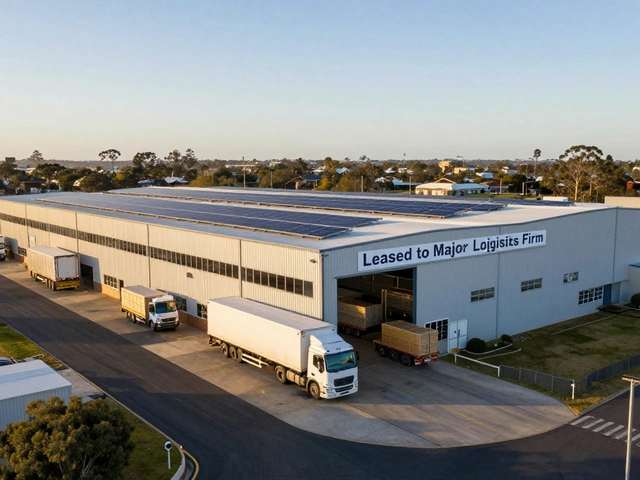Forget scouring random property sites and wasting hours with outdated listings. The right search engine can save you days—literally—when you're trying to land that perfect retail space, office tower, or industrial warehouse. The thing is, not all search engines are created equal. Some only show you a tiny slice of what’s out there, while others drown you in useless junk from last year. And with the surge in demand for smarter, faster real estate deals, the old ways just don't cut it anymore.
The best commercial real estate (CRE) platforms rise above ordinary listing sites. They mix raw property data with hyper-specific filters, live market insights, and slick user interfaces that don’t make you want to throw your laptop out the window. But where should you even start in 2025—when platforms leapfrog each other at breakneck speed? Let’s unpack the current landscape and clear up the noise around CRE search engines.
What Makes a Commercial Real Estate Search Engine Stand Out?
Not every CRE search site is worth your time. The real winners, like LoopNet, CREXi, and CommercialCafe, earned their spots by giving you more than a big dumb list of buildings. They’re like a supercharged GPS that fires you straight to the properties you can actually act on—and helps you see around corners nobody else is looking at yet.
- Depth of Data: The best platforms don’t stop at basic info. You’ll get historical sales, previous tenants, zoning realities, owner contact details, and sometimes even drone videos and 3D walkthroughs.
- Search Filters: Looking for light industrial within a 10-minute drive of a certain port? Or medical space under $30/sqft on flexible lease terms? A solid engine will let you slice and dice searches by almost anything: price, size, location, use, cap rate, occupancy, and loads more.
- Market Insights: Ever notice how some sites feel stale, like they’re just recycling old newspaper listings? The best engines pipe in real-time trends—think rent averages, absorption rates, and vacancy shifts so you spot hidden deals or tricky competition fast.
- Mobile and Collaboration Tools: You’re not always at a desk. Tools that work flawlessly on your phone, let you share picks with partners, or leave notes for your broker, make searching productive, not painful.
And let’s not ignore the role of integrations. Plugging into apps like Salesforce, Excel, or your calendar—with one click—keeps commercial pros in the flow instead of toggling through twenty tabs. These small touches are non-negotiable in 2025’s market, where deals fly by at warp speed.
Top Search Engines for Commercial Real Estate in 2025
Anyone who’s poked around commercial listings in the last few years knows the usual suspects, but fortunes shift fast. As of this year, these platforms have emerged as real leaders—each with its own strengths. Here’s what the front-runners look like right now:
- LoopNet: Still the undisputed king when it comes to volume. With 800,000+ active listings, LoopNet is where most brokers and landlords start. Its filters are deep, the map search is snappy, and you can dig up ownership data or photos with very little friction. It now pulls in market stats and trendlines thanks to its parent company, CoStar.
- CREXi: Manages to blend massive inventory with cutting-edge tech. CREXi’s claim to fame is speed, transparency, and a sleek user experience. Their auction and due diligence features cater to both quick flips and more complex transactions, plus you’ll find exclusive bid-only deals.
- CommercialCafe: Carves out a niche with its focus on office, coworking, and flex spaces. Great for startups, expanding businesses, and anyone hunting subleases or short-term deals with all the extras—photos, virtual tours, and up-to-date details from verified landlords.
- PropertyShark: Where research nerds go wild. Property history, liens, development filings, comps, and interactive maps that pull you into superlocal zones. If you’re less concerned about pretty buttons and more in love with raw data, this is your place.
- Brevitas: Leans into private and off-market deals. Designed for investors chasing boutique assets, portfolio sales, or unique opportunities nobody else has seen yet. Its matching algorithms alert you as soon as new deals hit the system, and it plays nice with international buyers too.
| Platform | Listings Volume | Main Specialties | Key Feature |
|---|---|---|---|
| LoopNet | 800,000+ | All CRE types | Market stats, ownership lookups |
| CREXi | 500,000+ | All CRE, auctions | Bid process, due diligence |
| CommercialCafe | 60,000+ | Office, coworking | Flexible terms, virtual tours |
| PropertyShark | 400,000 (with public records) | Deep research, comps | Liens, permits, sales history |
| Brevitas | 50,000+ | Private, off-market | Deal matching algorithms |
It’s worth noting that all these players focus on verified, direct-from-owner, or broker-listed properties, ditching old school classified spam. Most also allow guest browsing—no account needed—so you’re not immediately bombarded by sales calls unless you want to reach out. Think of it as the evolution CRE pros begged for years ago.

Hidden Features the Best CRE Search Engines Offer
The best CRE platforms don’t just list buildings—they’re one step ahead, especially for professionals with specific needs. Here’s what’s changed for the better:
- AI-Driven Suggestions: Not just fancy window dressing. Platforms like CREXi and Brevitas now crunch what you actually search, then recommend similar listings, trending submarkets, or even early-stage development sites before they hit public lists.
- Deal Analytics: Modern engines show cap rate trends, tenant risk, comparable leases, and even migration patterns. These insights can drop days off your due diligence time.
- Collaboration Panels: Perfect for teams or remote investors. Shared dashboards and chat boards let lawyers, partners, or brokers comment in real time on key listings (so no more endless back-and-forth emails).
- Integrated Document Vaults: Many sites let you store and share PDFs, proformas, plans, and environmental reports inside their system. Some even have e-signature built-in, so you can move from browsing to negotiating without hopping apps.
- On-The-Go Access: Mobile isn’t an afterthought anymore. Full-featured apps for iOS and Android let you search, schedule tours, and message brokers while running between meetings or even standing outside a property you just spotted.
As demand for off-market deals has soared—especially industrial and specialty retail—more sites now dabble in private listings. Brevitas and certain tiers of LoopNet provide whisper listings, connect you to verified landlords, and sometimes get you inside exclusive-buying syndicates or investment groups if you’re registered and meet their criteria.
The magic? These platforms update by the minute, not by the week. Some track live price drops or new lease terms, putting agile searchers first in line. This is especially huge in markets where inventory turns quickly, like Sunbelt metros or major European logistics hubs.
Tips on Getting More From CRE Search Engines
Don’t just type in a zip code and hope for the best. Getting smarter results means using all the tricks top CRE pros rely on. Here’s what actually works in 2025:
- Get Specific With Filters: Drill into submarkets, not just cities. Search by anchor tenants, proximity to highways, zoning overlays, or tenant type. The more specific your filter, the less time wasted sifting junk.
- Set Alerts and Saved Searches: Good platforms email or text you the second a new property matching your criteria hits. You’ll catch hidden gems before they’re poached by big funds or franchisees.
- Read Market Reports: Don’t stop at listings. LoopNet and PropertyShark pump out quarterly or monthly trend reports by asset type and region. A quick scan helps you negotiate harder and spot areas where asking rents are slipping—prime time for a lower offer.
- Check Ownership Records: See if a site links to deeds, lender data, or LLC filings. This lets you avoid daisy-chained brokers and deal directly with decision makers, and maybe even sniff out a distressed seller sooner.
- Use Map and Heat View Features: The best sites now let you overlay listings by rent trends, vacancy rates, or tenant density. Want a pad near a fast-growing tech corridor? Map layers make it obvious instead of just guessing.
- Trust, But Verify: Even with great platforms, double-check critical info like square footage, taxes, or expiration dates with your broker or the local tax assessor. A slick listing can still hide surprise headaches.
Chasing the commercial real estate sweet spot rarely happens by accident. Pulling off a great lease or buy in 2025 means mastering—not just using—the top search engines. Spend an afternoon poking through demo accounts on two or three platforms and you’ll spot which interface clicks for you. In a market that moves like today’s, that confidence (and speed) can be the edge that seals your next deal.





